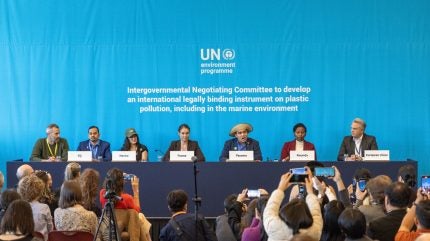
The UN summit on plastic pollution has ended without formal consensus, despite widespread support for ambitious measures.
The summit, held in Busan, South Korea, was marked by calls for a globally binding treaty to address plastic pollution across its entire life cycle.
During the final plenary session, Rwanda’s lead negotiator, Juliet Kabera, received applause for advocating a comprehensive treaty.
Mexico, along with 95 other countries, emphasised the need for binding global bans on harmful plastic products and chemicals.
Meanwhile, World Wildlife Fund (WWF) expressed disappointment over the lack of progress.
The organisation highlighted the need for a robust financial mechanism and means to strengthen the treaty over time.
WWF global plastics policy lead Eirik Lindebjerg said: “After another week of hard-fought and frustrating negotiations in Busan, the meeting has closed with governments no closer to agreeing on a solution to the worsening plastic crisis. It has now been over 1,000 days and five negotiation meetings since governments agreed to establish a legally binding treaty to end plastic pollution.
“Over this time, more than 800 million tonnes of plastic has been produced, over 30 million tonnes of which have leaked into our ocean, harming wildlife, poisoning ecosystems and destroying lives, to say nothing of the plastic that has been sent to landfill or burnt. For too long, a small minority of states have held the negotiation process hostage.”
He emphasised the fact that those most impacted by plastic pollution are being denied the chance to collaborate on a solution while those profiting from the unregulated production and consumption of plastic continue to benefit.
He pointed out that it is becoming increasingly clear that the countries committed to securing a meaningful agreement must be prepared to form a coalition of willing countries and adopt a treaty, even if it means proceeding without full global consensus.
“If INC-5 [Intergovernmental Negotiating Committee] has shown us anything it’s that we are not going to find the solution we desperately need through more of the same. The crisis demands more. People and wildlife demand more. And it is our governments’ job to deliver,” Lindebjerg added.
The proposed treaty includes four binding global measures throughout the entire plastic life cycle.
It calls for the ban and phase-out of the most harmful and problematic plastic products, as well as chemicals.



